

What You Can't Say. January 2004.
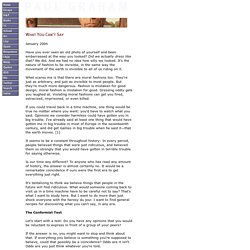
The Top 10 Psychology Studies of 2010. The end of 2010 fast approaches, and I'm thrilled to have been asked by the editors of Psychology Today to write about the Top 10 psychology studies of the year. I've focused on studies that I personally feel stand out, not only as examples of great science, but even more importantly, as examples of how the science of psychology can improve our lives.
Each study has a clear "take home" message, offering the reader an insight or a simple strategy they can use to reach their goals , strengthen their relationships, make better decisions, or become happier. If you extract the wisdom from these ten studies and apply them in your own life, 2011 just might be a very good year. 1) How to Break Bad Habits If you are trying to stop smoking , swearing, or chewing your nails, you have probably tried the strategy of distracting yourself - taking your mind off whatever it is you are trying not to do - to break the habit. J. 2) How to Make Everything Seem Easier. How to Build Self-Discipline. Discipline is freedom.

You may disagree with this statement, and if you do you are certainly not alone. For many people discipline is a dirty word that is equated with the absence of freedom. In fact the opposite is true. As Stephen R. Why harmony pleases the brain - physics-math - 19 September 2011. The key to pleasant music may be that it pleases our neurons.
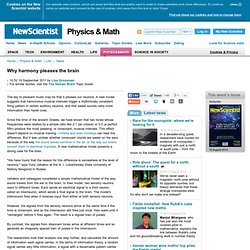
A new model suggests that harmonious musical intervals trigger a rhythmically consistent firing pattern in certain auditory neurons, and that sweet sounds carry more information than harsh ones. Since the time of the ancient Greeks, we have known that two tones whose frequencies were related by a simple ratio like 2:1 (an octave) or 3:2 (a perfect fifth) produce the most pleasing, or consonant, musical intervals. This effect doesn't depend on musical training – infants and even monkeys can hear the difference. But it was unclear whether consonant chords are easier on the ears because of the way the sound waves combine in the air, or the way our brains convert them to electrical impulses.
A new mathematical model presents a strong case for the brain. Possibilianism. Not to be confused with Possibilism.
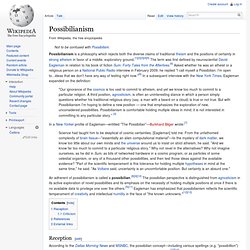
Possibilianism is a philosophy which rejects both the diverse claims of traditional theism and the positions of certainty in strong atheism in favor of a middle, exploratory ground.[1][2][3][4][5] The term was first defined by neuroscientist David Eagleman in relation to his book of fiction Sum: Forty Tales from the Afterlives.[6] Asked whether he was an atheist or a religious person on a National Public Radio interview in February 2009, he replied "I call myself a Possibilian: I'm open to...ideas that we don't have any way of testing right now. Aesthetics Aesthetics may be defined narrowly as the theory of beauty, or more broadly as that together with the philosophy of art.
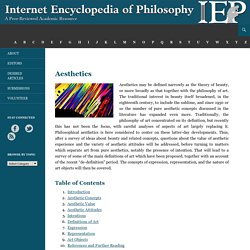
The traditional interest in beauty itself broadened, in the eighteenth century, to include the sublime, and since 1950 or so the number of pure aesthetic concepts discussed in the literature has expanded even more. Traditionally, the philosophy of art concentrated on its definition, but recently this has not been the focus, with careful analyses of aspects of art largely replacing it. Philosophical aesthetics is here considered to center on these latter-day developments. 56 Things I Wished I’d Known When I Was Younger. Nietzsche's "Thus Spoke Zarathustra" Chapter 1. The Empathic Civilisation. Popular Quotes. An Unforgettable Act of Kindness. MSNBC - How to Think About the Mind.
How to Think About the MindNeuroscience shows that the 'soul' is the activity of the brain Sept. 27 issue - Every evening our eyes tell us that the sun sets, while we know that, in fact, the Earth is turning us away from it.
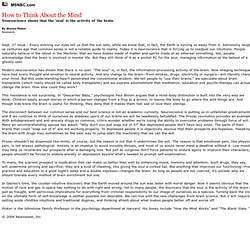
Astronomy taught us centuries ago that common sense is not a reliable guide to reality. Table of Contents. Gnaural: A Binaural-Beat Audio Generator. A . Life Inspirations. Yoga üben im Abo – flexibel und abwechslungsreich. Ashtanga-Yoga für Anfänger: lerne mit Dr. Ronald Steiner. Yoga positions (Asana, poses) and moves (Vinyasa) for Ashtanga. The complete system of Yoga positions (Asana) and dynamic movement (Vinyasa) from Ashtanga Yoga.

This includes detailed pictures of all poses as well as explanations. Let it flow! Yoga is 99 % practice and 1 % theory. Asanas give the body a new shape and allow us to excel beyond our limitations. Thereby the physical practice symbolizes our spiritual way: the willingness to refine ourselves and the confidence to change. Invalidation. Excerpts from an article by Cathy Palmer-Scruggs (Full article) Recently, I had a few situations to come up that called for some comfort from my friends.
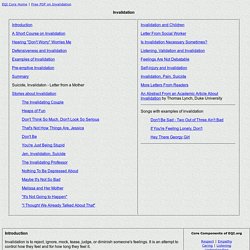
Emotional Intelligence. The Meaning of Life: An interview with Professor A C Grayling. PETER BRIETBART meets world-renowned philosopher, humanist and atheist A.C.
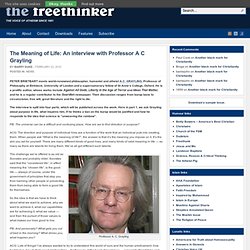
GRAYLING, Professor of Philosophy at Birkbeck, University of London and a supernumerary fellow of St Anne’s College, Oxford. He is a prolific author, whose works include Against All Gods, Liberty in the Age of Terror and Ideas That Matter, and he is a regular contributor to the Guardian newspaper. Their discussion ranges from burqa bans to circumcision, free will, great literature and the right to die. The interview is split into four parts, which will be published across the week.